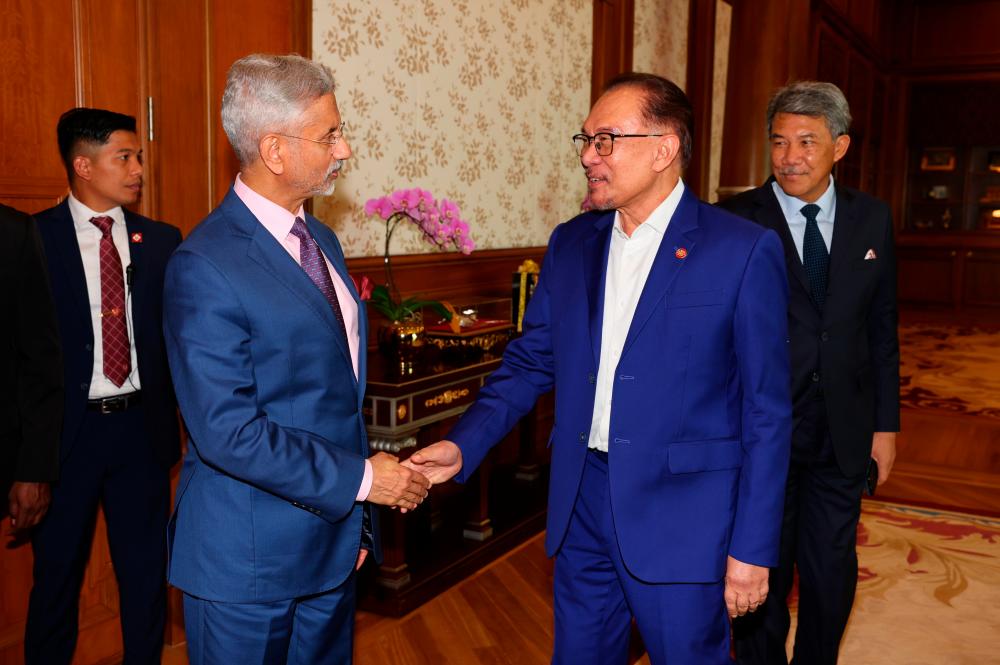KUALA LUMPUR: Fostering mutual trust and reliability as foundational pillars for bilateral cooperation between India and Malaysia holds significant importance, says India’s External Affairs Minister, Dr S.Jaishankar.
The minister, who is currently on a two-day official visit to Malaysia starting Wednesday, said as India and Malaysia embark on a path towards closer relations, they must acknowledge the challenges posed by an evolving global landscape and stressed the significance of leveraging the unique attributes shared by both nations.
“And one way by which we can be of great support to each other is really to build on these very special factors of our times.
“The fact that we trust each other. The fact that on crucial matters we have been reliable for each other. The fact that in many ways, both physically and culturally, emotionally, we are much closer to each other,” he said in his keynote address during the interaction session with the Indian community in Malaysia here last night, which was attended by Indian politicians, community leaders, academicians, and foreign media, among others.
He further highlighted that in today’s world, partnerships between countries often rely heavily on trust, closeness, and reliability, emphasising the importance of these factors in fostering strong and enduring relationships.
During his visit to Malaysia, Jaishankar met Prime Minister Datuk Seri Anwar Ibrahim and exchanged views and discussed cooperation in the areas of trade, science and technology, education, agriculture, tourism, defence, and digital, and also on regional issues including Myanmar.
He also met foreign minister Datuk Seri Mohamad Hasan, focusing on the trajectory of India-Malaysia relations, besides several chief executive officers in Malaysia.
India was Malaysia’s 12th largest global trading partner last year with total trade amounting to RM77.76 billion (US$16.53 billion).
On a question posed by a representative from the Times of India on the momentum of India-ASEAN relationships in moving forward at a time when Malaysia will be the chair of the regional grouping in 2025, Jaishankar emphasised the need for further collaboration and deepening of relationships with ASEAN and India.
He said India values Malaysia’s upcoming chairmanship of ASEAN in 2025 and hopes for clearer direction and more definitive outcomes from ASEAN discussions.
Addressing the potential areas of cooperation between India and ASEAN, the minister highlighted the significance of embracing new technologies and digital advancements, while emphasising the importance of leveraging emerging industries, such as sunrise industries, to unlock new possibilities for economic growth and development.
The minister underscored the importance of enhancing mobility and talent sharing, recognising it as a crucial factor in fostering mutual prosperity and progress.
However, beyond economic partnerships, the minister stressed the importance of nurturing the softer aspects of the relationship.
He emphasised the shared cultural heritage and historical ties between India, ASEAN, and Malaysia, stressing the need to promote greater tourism, travel, and people-to-people interactions.
“We want the people of India and Southeast Asia to appreciate our shared past, and common traditions, and to promote more tourism, travel, interactions, and contacts among young people,” he added.
Jaishankar also described the Indian diaspora as a “living bridge” connecting India with other nations and emphasised the diaspora’s role in fostering closer ties between India and countries around the world, including ASEAN nations and Malaysia.
In a related development, the minister underscored the evolution of the enhanced strategic partnership between India and Malaysia initiated in 2015, noting the significant growth in trade and cross-investments between the two nations.
He also said for some time now, there have been discussions about bringing some of India’s premier educational institutions, like the Indian Institute of Technology, to Malaysia, aiming to strengthen both countries’ event capabilities through mutual learning and experience sharing.
The minister in his speech also outlined India’s role on the global stage, emphasising its contributions to addressing global challenges, such as COVID-19, conflicts, and climate change. -Bernama









